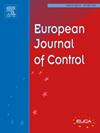基于 K 步控制不变集的非线性模型预测控制
IF 2.6
3区 计算机科学
Q2 AUTOMATION & CONTROL SYSTEMS
引用次数: 0
摘要
非线性模型预测控制(NMPC)的基本问题之一是能够保证基础后退视界优化的递归可行性。换句话说,安全 NMPC 设计的首要条件是确保闭环解决方案无限期地保持在优化问题的可行集内。这个问题可以通过引入以控制不变集描述的终端约束来解决。然而,非线性系统的控制不变集往往由于其复杂性而难以使用,甚至难以构建。K 步控制不变集是对经典的一步控制不变集的概括,并被证明保留了 MPC 设计的有用特性,但通常具有更简单的表示方法,因此具有更大的适用性。本文提出了一种基于 K 步控制不变集的新型 NMPC 方案。我们采用符号控制技术计算 K 步控制不变集,并通过将该不变集整合为终端约束来构建 NMPC 框架,从而确保递归可行性。本文章由计算机程序翻译,如有差异,请以英文原文为准。
Nonlinear model predictive control based on K-step control invariant sets
One of the fundamental issues in Nonlinear Model Predictive Control (NMPC) is to be able to guarantee the recursive feasibility of the underlying receding horizon optimization. In other terms, the primary condition for a safe NMPC design is to ensure that the closed-loop solution remains indefinitely within the feasible set of the optimization problem. This issue can be addressed by introducing a terminal constraint described in terms of a control invariant set. However, the control invariant sets of nonlinear systems are often impractical to use or even to construct due to their complexity. The -step control invariant sets are representing generalizations of the classical one-step control invariant sets and prove to retain the useful properties for MPC design, but often with simpler representations, and thus greater applicability. In this paper, a novel NMPC scheme based on -step control invariant sets is proposed. We employ symbolic control techniques to compute a -step control invariant set and build the NMPC framework by integrating this set as a terminal constraint, thereby ensuring recursive feasibility.
求助全文
通过发布文献求助,成功后即可免费获取论文全文。
去求助
来源期刊

European Journal of Control
工程技术-自动化与控制系统
CiteScore
5.80
自引率
5.90%
发文量
131
审稿时长
1 months
期刊介绍:
The European Control Association (EUCA) has among its objectives to promote the development of the discipline. Apart from the European Control Conferences, the European Journal of Control is the Association''s main channel for the dissemination of important contributions in the field.
The aim of the Journal is to publish high quality papers on the theory and practice of control and systems engineering.
The scope of the Journal will be wide and cover all aspects of the discipline including methodologies, techniques and applications.
Research in control and systems engineering is necessary to develop new concepts and tools which enhance our understanding and improve our ability to design and implement high performance control systems. Submitted papers should stress the practical motivations and relevance of their results.
The design and implementation of a successful control system requires the use of a range of techniques:
Modelling
Robustness Analysis
Identification
Optimization
Control Law Design
Numerical analysis
Fault Detection, and so on.
 求助内容:
求助内容: 应助结果提醒方式:
应助结果提醒方式:


